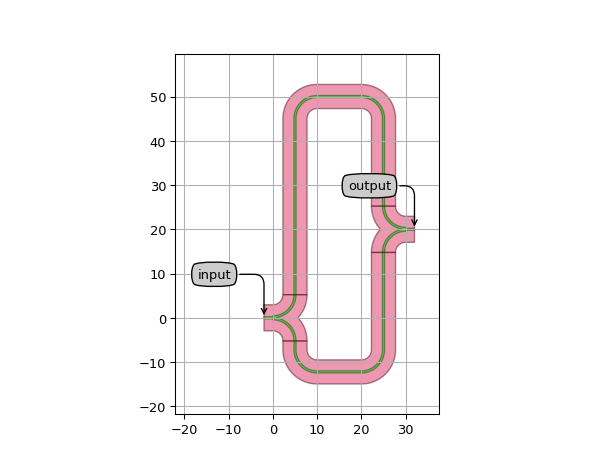place_and_route
- ipkiss3.all.place_and_route(insts, specs=None, strict=None)
Function to place and route a series of instances with the help of placement specifications and connectors.
The supported placement specifications and connectors can be found under the i3 namespace (see also Placement and routing reference and Connector reference).
Always be as specific as possible when providing the placement specifications. The placement engine will change the positions of instances that are specified in the specifications list.
For instance, if you have multiple specs without using Place, that tells the placement engine that the location of the full circuit (or at least that one instance) is not important. The instances will still be placed relative to each other as specified, but their position might change when you add more specs. By using Place, you anchor your circuit.
You can chain multiple calls of this function after each other where the output of one call is the input to the insts argument on the next call.
- Parameters:
- insts: InstanceDict or dict or Layout
In case of a dictionary, it has the form of {inst_name: PCell/Layout view}.
- specs: Iterable
List of placement specifications and connector specifications between ports.
- strict: bool
If True, any routing error will raise an exception and stop the program flow. If False, any routing error will give a warning and draw a straight line on an error layer. See
i3.ConnectLogicalfor more information.
- Returns:
- InstanceDict or Layout
If the input insts argument is an InstanceDict or dict, the function returns an InstanceDict containing the placed instances and any created waveguides.
If the input insts is a Layout object, the function returns a new Layout instance which includes the original ports and elements, along with the newly placed instances and created waveguides.
See also
ipkiss3.all.CircuitConvenience PCell that uses place_and_route internally.
ConnectManhattanConnectBendConnectManhattanTaperedConnectLogicalCircuitexpose_ports
Examples
import si_fab.all as pdk import ipkiss3.all as i3 from picazzo3.wg.splitters import WgYSplitter, WgYCombiner class MyPCell(i3.PCell): class Layout(i3.LayoutView): def generate(self, layout): layout += i3.place_and_route( insts={"splitter": WgYSplitter(), "combiner": WgYCombiner()}, specs=[ i3.Place("splitter", (0, 0)), i3.Place("combiner", (30, 20), relative_to="splitter"), i3.ConnectManhattan( "splitter:arm2", "combiner:arm2", control_points=[i3.H(50)], bend_radius=5.0, ), i3.ConnectManhattan( "splitter:arm1", "combiner:arm1", "wg_name", bend_radius=5.0 ), ], ) layout += i3.expose_ports( layout, {"splitter:center": "input", "combiner:center": "output"} ) return layout pcell = MyPCell() pcell_lo = pcell.Layout() pcell_lo.visualize(annotate=True)
